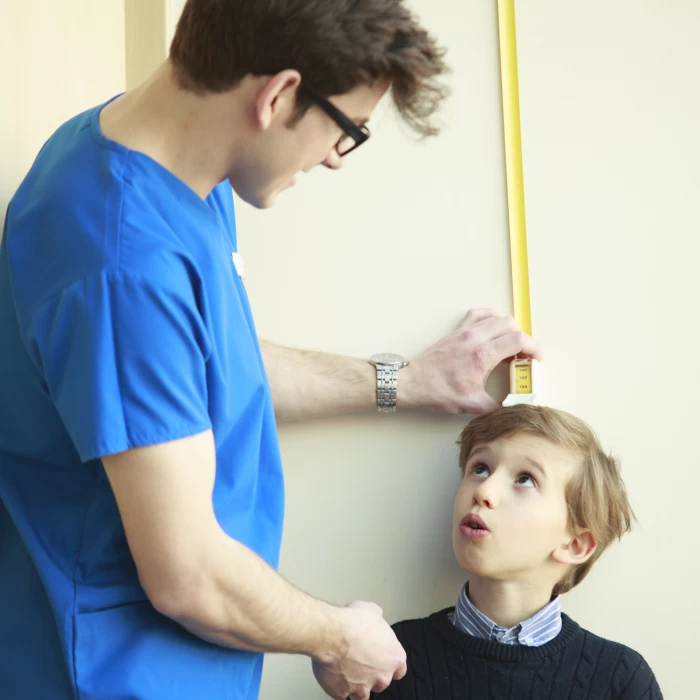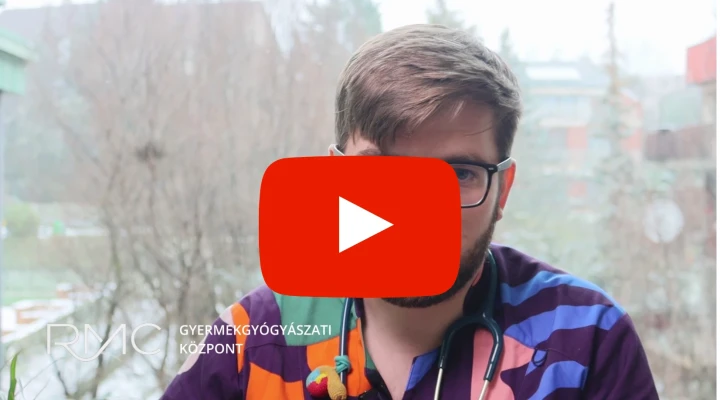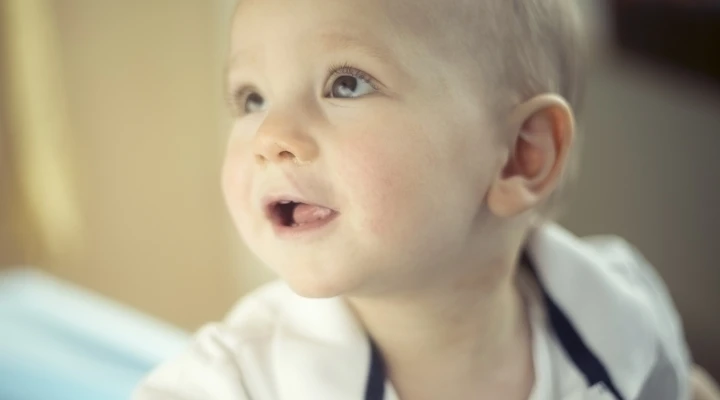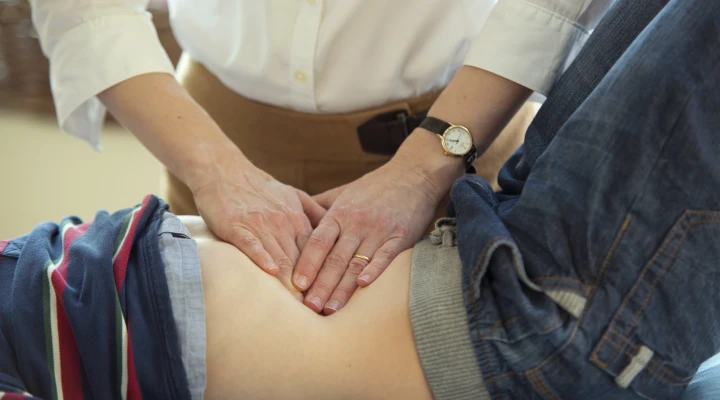Early diagnosis in childhood is essential as many problems can be resolved quickly and treated effectively at this age. Regular screenings also help shape children’s attitude to health, helping them learn what they should pay attention to if they want to maintain a good state of general health. Our screening packages for children provide age-specific screenings in accordance with both Hungarian and American guidelines.
Pediatric consultations according to American practices, including the following:
The screening is yearly recommended.
- Complete pediatric physical examination
- Recording of family and individual medical history
- Discovery of any identifiable physical or neurological disorders
- Referral to a specialist as required
- Basic screening for motor skills development
- Advice on and administration of required and optional vaccines
- Screening for sleep-related disorders
- Advice on proper nutrition
- Discussion of quality and form of feces
- Provision of educational materials dealing with age and environment-specific issues
The screening is yearly recommended.
Children’s most intense period of intellectual and physical development comes in their early childhood. The development of movement and speech and social skills are all formed during this period, which is exciting and challenging at the same time. It is also the best time to correct any developmental, treatable problems that the child may be struggling with, with early detection increasing the chances of successful treatment. It is also an excellent time for parents to educate their children on the importance of a healthy lifestyle.
ONE YEAR OLD
THREE YEARS OF AGE
FIVE YEARS OF AGE
ONE YEAR OLD
- Annual screening
- Comprehensive pediatric physical examination
- Record taken of family and individual medical history
- Discovery of any identifiable physical or neurological anomalies
- Referral to a specialist as required
- Basic screening for motor skills development
- Advice regarding and administration of mandatory and optional vaccines
- Screening for sleep-related disorders
- Advice on proper nutrition
- Discussion of quality and form of feces
- Provision of educational materials dealing with age- and situation-specific issues, including baby safety and baby equipment
- Examination of development and fine and gross motor skills
- Examination of linguistic and social development
- Eye test
- Refractive errors: screening for short-sightedness, far-sightedness and astigmatism
- Examination of differences in refractive errors between the two eyes
- Examination for appropriate visual fixation, eye movements, stereopsis, clarity and health of the lenses of the eye
- Screening for dioptric issues, strabismus and amblyopia in order to be able to begin treatment in the most sensitive period
- Dental screening
- Monitoring the health of erupted teeth
- Identification of any teething-related symptoms and possible treatments
- Identification of early tooth decay and possible treatments
- Advice on dental hygiene
THREE YEARS OF AGE
- Annual screening
- Comprehensive pediatric physical examination
- Record taken of family and individual medical history
- Discovery of any identifiable physical and neurological anomalies
- Referral to a specialist as required
- Basic screening for motor skills development
- Advice regarding and administration of obligatory and optional vaccines
- Screening for sleep-related disorders
- Advice on proper nutrition
- Discussion of quality and form of feces
- Provision of educational materials dealing with age- and situation-specific issues, e.g. baby safety and baby equipment
- Examination of development and fine and gross motor skills
- Examination of linguistic and social development
- Eye screening
- Record of subjective clarity of vision, with the help of age-appropriate sight charts
- Strabismus (crossed eyes) screening: children aged two and a half to three, place more burden on their near vision due to increased interest in fine motor activity. At this time, most far-sighted children begin to experience some degree of strabismus due to over-adaptation.
- Dental screening
- Primarily control for tooth decay and the condition of the gums
- Identification of early tooth decay and possible treatments
- Age-specific information: what parents should do if their child sustains dental trauma
FIVE YEARS OF AGE
- Annual screening
- Comprehensive pediatric physical examination
- Record taken of family and individual medical history
- Discovery of any identifiable physical or neurological anomalies
- Referral to a specialist as required
- Basic screening for motor skills development
- Advice on and administration of obligatory and optional vaccines
- Screening for sleep-related disorders
- Advice on proper nutrition
- Discussion of quality and form of feces
- Provision of educational materials dealing with age- and situation-specific issues, e.g. how to choose which bicycle to buy
- Examination of development and fine and gross motor skills
- Examination of linguistic and social development
- Measurement of blood pressure
- Screening for curvature of the spine
- Urine test: exclusion of diabetes, kidney disease and kidney infections
- Vision assessment
- Dental screening
- Checking bite
- Control for tooth decay and gum disease
- Checking growth of lower incisors
- Identification of early tooth decay and possible treatments
- Advice on dental hygiene
- Orthodontic and myofunctional screening
Starting school is a time of ever-increasing independence and many new challenges. It behooves the parents to screen for conditions that could impact the child's educational plan. Is vision good? Can the child interpret sounds and follow directions? Does the child have food allergies and does he/she know how to avoid the allergen?
SIX YEARS OF AGE
SEVEN YEARS OF AGE
AGED 8-13
SIX YEARS OF AGE
- Annual screening
- Comprehensive pediatric physical examination
- Record taken of family and individual medical history
- Discovery of any identifiable physical and neurological anomalies
- Referral to a specialist as required
- Basic screening for motor skills development
- Advice regarding and administration of obligatory and optional vaccines
- Screening for sleep-related disorders
- Advice on proper nutrition
- Discussion of quality and form of feces
- Provision of educational materials dealing with age- and situation-specific issues, e.g. teaching your child how to react in the event of fire
- School maturity, social integration, self-esteem assessment
- Measurement of blood pressure
- Screening for curvature of the spine
- Urine test: exclusion of diabetes, kidney disease and kidney infections
- Vision assessment
- Eye screening
- Preparing the child for visual burden of attending school: screening for fine dioptric errors and hidden strabismus
- Dental screening
- Checking bite
- Check for tooth decay and gum disease
- Checking growth of lower incisors
- Identification of early tooth decay and possible treatments
- Advice on dental hygiene
SEVEN YEARS OF AGE
- Annual screening
- Comprehensive pediatric physical examination
- Record taken of family and individual medical history
- Discovery of any identifiable physical or neurological anomalies
- Referral to a specialist as required
- Basic screening for motor skills development
- Advice regarding and administration of obligatory and optional vaccines
- Screening for sleep-related disorders
- Advice on proper nutrition
- Discussion of quality and form of feces
- Provision of educational materials dealing with age- and situation-specific issues, e.g. preventing sporting injury
- School maturity, social integration, self-esteem assessment
- Measurement of blood pressure
- Screening for curvature of the spine
- Urine test: exclusion of diabetes, kidney disease and kidney infections
- Vision assessment
- Dental screening
- Check for tooth decay and gum disease
- Identification of early tooth decay and possible treatments
- Advice on dental hygiene
- Screening with orthodontist
AGED 8-13
- Annual screening
- Comprehensive pediatric physical examination
- Record taken of family and individual medical history
- Discovery of any identifiable physical and neurological anomalies
- Referral to a specialist as required
- Basic screening for motor skills development
- Advice regarding and administration of obligatory and optional vaccines
- Screening for sleep-related disorders
- Advice on proper nutrition
- Discussion of quality and form of feces
- Provision of educational materials dealing with age- and situation-specific issues, e.g. speaking with children about smoking
- Assessment of self-esteem, self-confidence, healthy independence and social integration
- Help offered in the event of anorexia, depression or being overweight
- Measurement of blood pressure
- Screening for curvature of the spine
- Urine test: exclusion of diabetes, kidney disease and kidney infections
- Vision assessment
- Dental screening
- Check for tooth decay and gum disease
- Identification of initial tooth decay and possible treatments
- Advice on dental hygiene
Adolescence is a time of turbulent, exciting growth. Teens today face tremendous social and academic pressure, in addition to dealing with complex physical, hormonal and emotional changes. The pediatrician can offer advice and treatment regarding a myriad of issues, including acne, sexuality, learning and attention, drug, alcohol and tobacco use prevention, depression, nutrition and eating disorders, just to name a few.
AGED 13-14
AGED 17-18
AGED 13-14
- Annual screening
- Comprehensive pediatric physical examination
- Record taken of family and individual medical history
- Discovery of any identifiable physical or neurological anomalies
- Referral to a specialist as required
- Basic screening for motor skills development
- Advice regarding and administration of obligatory and optional vaccines
- Screening for sleep-related disorders
- Advice on proper nutrition
- Discussion of quality and form of feces
- Provision of educational materials dealing with age- and situation-specific issues, e.g. healthy relationships, being respected
- Assessment of self-esteem, self-confidence, healthy independence and social integration
- Help offered in the event of anorexia, depression or being overweight
- Information on smoking, alcohol consumption and sexual health
- School results, discussion on further education
- Measurement of blood pressure
- Screening for curvature of the spine
- Urine test: exclusion of diabetes, kidney disease and kidney infections
- Vision assessment
- Dental screening
- Check for tooth decay and gum disease
- Identification of early tooth decay and possible treatments
- Advice on dental hygiene
- Ear, nose and throat (ENT) screening
AGED 17-18
- Annual screening
- Comprehensive pediatric physical examination
- Record taken of family and individual medical history
- Discovery of any identifiable physical or neurological anomalies
- Referral to a specialist as required
- Basic screening for motor skills development
- Advice regarding and administration of obligatory and optional vaccines
- Screening for sleep-related disorders
- Advice on proper nutrition
- Discussion of quality and form of feces
- Provision of educational materials dealing with age- and situation-specific issues, e.g. healthy relationships, being respected
- Assessment of self-esteem, self-confidence, healthy independence and social integration
- Help offered in the event of anorexia, depression or being overweight
- Information on smoking, alcohol consumption and sexual health
- School results, discussion on further education
- Measurement of blood pressure
- Screening for curvature of the spine
- Urine test: exclusion of diabetes, kidney disease and kidney infections
- Vision assessment
- Dental screening
- Control for tooth decay and gum disease
- Identification of initial tooth decay and possible treatments
- Advice on dental hygiene
- Ear, nose and throat (ENT) screening
- Gynecological examination
- Cytology-based cancer screening (once sexual activity has begun)
- Dermatological screening
- Dermatoscopy screening for birthmarks and moles






